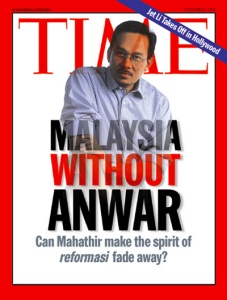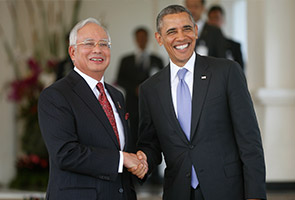May 19, 2015
Malaysia is not turning its back on refugees. It has been giving humanitarian assistance.This problem of human trafficking and racial discrimination has a beginning somewhere, usually in their home countries. Both Myanmar and Bangladesh have a responsibility to ensure that they take care of their own people and not burden their neighbours with their domestic problems. This is their primary duty that cannot be imposed on Malaysia, Thailand and Indonesia. It should not even be a matter for negotiation.
It is time both these countries own up to their own failures to care and protect their own people by providing education, health care and jobs. For all my criticisms of Malaysia’s political leadership on many issues, I can say with pride that our government and people are compassionate and helpful to displaced peoples since the days of the Vietnam War. But we cannot be burdened by this. It has become a regional and international one. ASEAN and the international community must act. Pressure must be brought to bear on both Myanmar and Bangladesh..–Din Merican
Don’t turn our backs on Refugees from Myanmar and Bangladesh
by Azrul Mohd Khalib
The quality of mercy is not strain’d,
It droppeth as the gentle rain from heaven
Upon the place beneath. It is twice blest:
It blesseth him that gives and him that takes.
‘T is mightiest in the mightiest: it becomes
The throned monarch better than his crown;
His sceptre shows the force of temporal power,
The attribute to awe and majesty,
Wherein doth sit the dread and fear of kings;
But mercy is above this sceptred sway,
It is enthroned in the hearts of kings,
It is an attribute to God himself;
And earthly power doth then show likest God’s,
When mercy seasons justice…
Though justice be thy plea, consider this,
That in the course of justice none of us
Should see salvation: we do pray for mercy;
And that same prayer doth teach us all to render
The deeds of mercy.William Shakespeare, “The Merchant of Venice”, Act 4 scene 1
Greatest English dramatist & poet (1564 – 1616)
The news that Malaysia had turned away two leaky boats packed to the nearest inch with hundreds of starving and malnourished Myanmar and Bangladeshi men, women and children was met with much dismay and horror by not only the international community, but also Malaysians.
These are refugees and migrants who have fled ethnic persecution and poverty only to be exploited and trafficked by people who viewed their human cargo as little more than a liability and nuisance that needed to be abandoned when things got too hot. They had no qualms leaving pregnant women, children and infants to suffer and die on those fishing boats stranded and adrift for months at sea.
Many are sick, weakened by hunger and thirst as a result of their ordeal. The bodies of those who died on these boats were tossed overboard.
Rather than show leadership in helping to tackle this humanitarian problem in a humane and compassionate way, our government decided to go the Australian way of dealing with the boat people: turn them around, point the boats in the opposite direction and make it someone else’s problem.
There are malnourished, sick, pregnant and dying adults and children on those boats. Where is our compassion for our fellow human beings?
One of those boats barely made it to Indonesian shores before sinking. More than 700 people were saved by fishermen. If that boat had sunk with all lives lost and knowing that we had a chance to save them, whose conscience would that be on?
The Malaysian government, as the proud chair of this year’s “people centred” Asean, has done us all a disservice by responding to this humanitarian crisis in a way that is callous, inhumane and lacking in compassion and humanity. Turning back the boats and treating it as somebody else’s problem makes a mockery of the “people centred” theme and caring society that we often thump our chests about.
The response by a minister that the boats should instead go to Cambodia or Philippines shows either his inability to read a map or the lack of understanding and appreciation for the desperate humanitarian situation.This “ping-pong” game with human lives is a travesty, inhumane and it must stop.
Why can’t ASEAN be known for once for being able to mobilise effective regional humanitarian action and cooperation? As chair, Malaysia should lead the way.We are better than this.
From the outcry and anger heard from thousands of Malaysians who have expressed their disapproval and anguish at the government’s actions that have exacerbated a humanitarian emergency, we know it was the wrong move to make.
True, nobody likes unwelcomed guests who could become considered a burden to resources. But no one wants to flee their own country, leave everything behind and be exiles away from home and loved ones. They did not come for fun, or by choice. They escaped persecution, extreme poverty and death in their own country. They come from different cultures and languages. They risked their lives to get here seeking sanctuary and protection. Are our hearts so small that we turn them away?
We are taught that we should “do unto others as you would have them do unto you.”It is not too late to save hundreds of lives.
Rohinyga and Bangladeshi refugees are transported to a navy boat where they will be taken to mainland Malaysia, after they landed at Pantai Pasir Berdengung beach in Langkawi May 14, 2015. — Reuters pic
Last week, thousands of desperate people landed in Langkawi in rickety boats. The police and immigration authorities are overwhelmed. Non-governmental organisations such as the Malaysian Consultative Council of Islamic Organisations (MAPIM) are mobilising to provide food, water as well as medical attention. It’s a colossal task. Please donate supplies as they are in constant need and they are fast running out.
A number of initiatives are being set up to help those at sea. Due to the logistical challenges, these are being worked out carefully and will be announced soon by their respective organisers.
Hundreds of Malaysians have come forward offering their services, donations of money and in kind to help those who have already landed and those still at sea. Just as it was during the floods late last year, these are Malaysians at their best and it shows what good we are capable of doing.
Come on Malaysia! We can do this. Let’s find it in our hearts and reach out to them with compassion as fellow human beings and prevent a humanitarian disaster on our watch.
* This is the personal opinion of the columnist.






